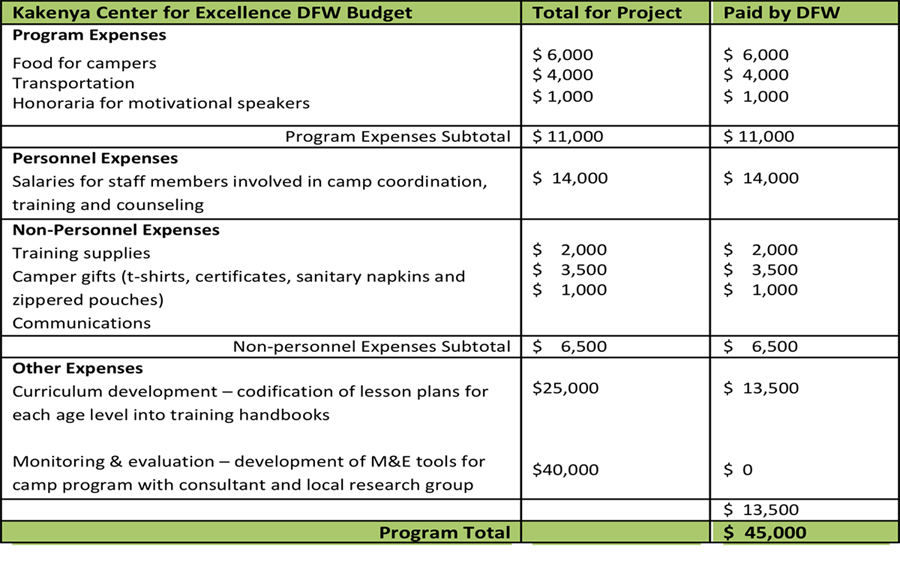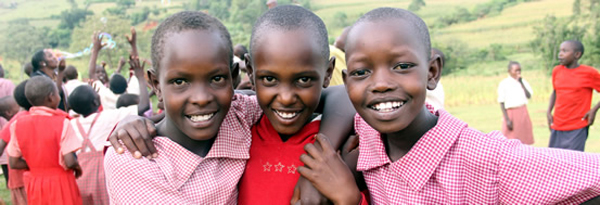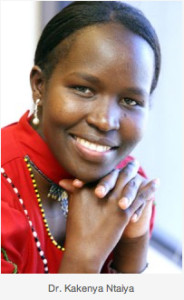
Mission
The Kakenya Center for Excellence (KCE) seeks to empower and motivate young girls through education to become agents of change and to break the cycle of destructive cultural practices in Kenya such as female genital mutilation and forced early marriage.
Life Challenges of the Women Served
Young Kenyan girls face many challenges, especially in remote villages such as the Maasai village of Enoosean, where KCE is currently piloting its programs. These challenges are key obstacles to leadership and economic independence for girls in Kenya:
- Early marriage and childbirth: According to the United Nations Population Fund, girls age 15 through 19 are twice as likely to die during pregnancy or child birth as those over age 20; girls under age 15 are five times more likely to die. In many areas of Kenya, girls are married before age 18. As a result, many girls become pregnant before their bodies fully develop and many die during childbirth.
- Lack of education: Most girls in Kenya know very little about their bodies, health, and sex education before they are subjected to female genital mutilation (FGM) in preparation for marriage, according to the 2011 article, ‘Youth in a Void’, by Njue et al. (p. 459-470).
- Lack of knowledge of legal rights and resistance to the law: Centuries-old customs remain strong and in place in remote and rural villages in spite of a Kenyan law prohibiting FGM. Although the 2008/2009 Kenya Demographic and Health Survey reported a national drop in FGM, some officials say the reported decline may be due to the practice being driven underground.
From a very young age, Maasai girls are taught by their elders to prepare for marriage and motherhood. Education for girls is neither valued nor a priority for family or community investment. In schools, girls do not receive the attention from teachers that is given to boys, and at home they are expected to do chores after school rather than homework. Thus, they tend to perform at a lower level than their male peers and most are unable to continue beyond primary education. Currently the biggest challenge for young Maasai girls is to stay in school despite pressure to drop out for marriage.
The Project
KCE’s Health and Leadership Training program provides Maasai girls in rural Kenya with crucial information and skills on a range of topics, including female health, female genital mutilation, leadership, self esteem, self defense, and their legal rights as children. The program gives the girls the tools they need to protect themselves from harmful cultural practices and pursue their dreams for the future rather than marrying young and becoming wives and mothers before completing their education.
The program has four primary goals:
- Increase girls’ knowledge about health and leadership-related skills, Kenya’s laws addressing the rights of children, and the harmful practices of FGM and early marriage.
- Give the girls in the community access to the fun and inspiring educational resources available through KCE.
- Foster long-term mentoring relationships and peer-to-peer training between KCE students and girls in the community.
- Empower and motivate young girls in all of the Maasai community to achieve their full potential.
Since 2011, Kakenya Center, which operates an all-girl boarding school for 155 at-risk girls, has expanded leadership opportunities beyond the school program to all girls in the community through special summer and holiday camps, held when public school is not in session.
The program targets adolescent girls about to enter puberty, a time of life associated with emotional turbulence. Skilled multidisciplinary female teams conduct two week-long training camps that consist of seminars, activities, and hands-on practice in leadership skills, self-defense, communication, goal setting, and career building, all of which help foster empowerment for the girls. Special emphasis is placed on female health, including otherwise taboo subjects of menstruation, FGM, HIV/AIDS and STDs.
The girls learn about the dangerous and damaging effects of FGM and child marriage, illegal practices that are still prevalent in the area. The girls learn that they are protected by law and do not have to submit to these practices. They learn how to discuss difficult and taboo topics with their parents and elders. A celebration at the conclusion of each camp, one of which is held at the same time that FGM ceremonies are traditionally held, reinforces the dignity of females and the importance of rites of passage.
With help from DFW funding, KCE will continue expanding its educational outreach through monthly weekend trainings at other schools in the surrounding area. Topics from the weeklong sessions are also covered in the weekend training, but over a longer period of time. The girls practice leadership skills by making presentations to their classmates and serving as mentors to new students.
An element of the program that is directly related to its sustainability is the codification of current training that will become a curriculum plan. Program trainers and consultants from similar programs will compile the collection of personal materials and lesson plans from individual trainers in order to produce a curriculum that can serve as a replicable model. The curriculum grade-level handbooks will be completed by the end of 2014.
Questions for Discussion
1. Why is it important for a program like KCE to focus on building health knowledge and leadership-related skills in girls in addition to concentrating on basic education?
2. What does a girl need in order to stand up for her rights and tell her parents and elders she is against harmful cultural practices like FGM and early marriage?
3. In what ways are leadership and mentoring skills critical elements of this program?
How the Grant Will be Used
The grant covers salaries (staff, coordinators, cooks, watchmen); curriculum development; monitoring and evaluation, training supplies; food and transportation for campers; camper gifts (T-shirts, certificates, sanitary napkins, cloth zip pouches for sanitary napkins); and graduation celebrations with all community members.
A large portion of the grant (30 percent) will be used for codification of the KCE training program into a set of training manuals that can be adapted for use in other communities similar to Enoosaen to further expand the number of girls who can be reached and to ensure consistency across all of the programs.
 Please note: If net donations exceed the Featured Program amount, we provide Sustained Program funding (grants to selected programs previously funded by Dining for Women) and provide a reserve to ensure we are able to meet future grant obligations. Read more about our Funding Model.
Please note: If net donations exceed the Featured Program amount, we provide Sustained Program funding (grants to selected programs previously funded by Dining for Women) and provide a reserve to ensure we are able to meet future grant obligations. Read more about our Funding Model.
Why We Love This Project/Organization
We love this project because the young Maasai girls who are facing customary FGM are mentored through empowerment and leadership training by an inspiring multidisciplinary staff. Together they journey through stages of growth as they learn to stand up for their rights, learn physical self defense, female heath, impact of child marriage, and grasp the wide range of choices available to educated girls. Due to this program, the customary girls’ “rite of passage” is being transformed from FGM to a profound community celebration acknowledging the value of girls.
Evidence of Success
KCE has trained 280 girls over the past two years at their Health and Leadership camps. None of the 60 girls from the boarding school who attended the camps have undergone FGM or have been married. Over 230 girls attended and participated in the 2012 graduation ceremony, which was carried out at the time of year when FGM ceremonies traditionally take place. More comprehensive data will track the success of the program in the future when the measurement and evaluation tools are completed and implemented.
Voices of the Girls
Here’s what girls who have attended the Health & Leadership camps had to say about their experience:
“Camp has enabled and encouraged me to work hard until I achieve my goals,” Nasieku, 13
“We were taught how to be a leader,” Juliet, 13
“We learned more about female genital mutilation and we will go and tell our friends back home,” Shura, 13
“The camp taught us about the girls’ rights and self-defense,” Evaline, 13
“In this school you won’t be circumcised and we come to the holiday camp,” Nampayio, 13
About the Organization
The Kakenya Center for Excellence embodies the remarkable spirit and strength of its founder as a beacon of hope for girls and a guideline for women.
I had a dream where all the girls in my village could go to school.
Dr. Kakenya Ntaiya
Kakenya Ntaiya, a Maasai woman born in the village of Enoosaen in the Transmara region of Kenya, Africa, was engaged at the age of 5. She was destined to be circumcised at puberty and married shortly after. Kakenya, who excelled in school, bargained with her father and the tribal leaders to be allowed to continue school after reaching puberty, then to leave the village and go to the U.S. to attend college. Her part of the bargain was to undergo female genital mutilation and to do something with her education to benefit Enoosaen.
The entire village raised the funds to send her to college in the U.S. She attended Randolph Macon Women’s College in Virginia and received her doctorate in Education from the University of Pittsburgh.
She kept her promise and returned to the village where she founded a boarding school for Maasai girls that opened its doors in 2009. The school currently has 155 students in grades four through eight. The school serves the area’s most vulnerable and underprivileged girls and focuses on academic excellence, health education, female empowerment, leadership and community development.
Most of the girls come from the Keiyan Division of the Trans Mara District and are primarily from Maasai households. Because the school’s capacity is limited, the Health and Leadership camp program was developed to expand the educational benefits to a growing number of girls in the region.
Kakenya Ntaiya was honored with a Vital Voices Global Leadership award in 2008 and as a National Geographic Emerging Explorer in 2010. She was named one of Newsweek’s “150 Women Who Shake the World” in 2011 and counted as one of the “Women Deliver 100: The Most Inspiring People Delivering for Girls and Women”.
She was a featured speaker at TEDx Mid-Atlantic Conference in 2012 and honored as a CNN Hero in 2013. Her story has been the subject of a Washington Post series, a BBC documentary, and many magazine articles.
Where They Work
The Kakenya Center for Excellence is located in Enoosaen, in the Rift Valley near the Maasai Mara Game Reserve. Enoosean is remote and a challenge to reach by car. Depending on the weather and road conditions, it can take all day to travel the 220 miles from Nairobi to the village.
According to Gascoigne’s “History of Kenya”, the Maasai were never the largest tribe in the region, but as they spread south into Kenya in the 18th century, they became the dominant one due to frequent raids on neighboring tribes to acquire more grazing land for their cattle. Oxfam’s briefing paper on pastoralism and climate change in east Africa (p. 2) discusses the loss much of the pastoralists’ range lands to agricultural development, national parks, and conservation areas.
The Maasai traditionally relied on their freedom of movement to manage grazing land effectively. With their cattle squeezed onto land areas too small to provide a sustainable livelihood, and the tribe’s population increasing, many Maasai have fallen into poverty.
Oxfam sees potential for pastoralist communities to help defray the damages of climate change if they are assisted, rather than constricted, by government and NGO policies. Their briefing paper states, “As a sustainable livelihood that contributes little in the way of emissions, pastoralism, if adequately supported, can play a valuable role in limiting the extent of global climate change by promoting reforestation and carbon sequestration through good rangeland management.” (p. 5)
Source Materials
Documentation and images provided by Kakenya Center for Excellence to Dining for Women
Trans Mara District Strategic Plan 2001-2010
Kenya National Bureau of Statistics Population Census Results, Kenya Census 2009
1994-1997 Welfare Monitoring Survey
The Last of the Maasai. Mohamed Amin, Duncan Willetts, John Eames, 1987
Africa Science News – Underage Marriages High in Kenya
‘Youth in a void’: sexuality, HIV/AIDS and communication in Kenyan public schools Sex Education Vol. 11, Iss. 4, 2011 (459-470) By Carolyne Njue, Helene Voeten, Beth Maina Ahlberg.
Kenya Legislation failing to curb FGM
Survival of the fittest – Pastoralism and climate change in East Africa – Oxfam
History of Kenya – Maasai and Kikuyu


